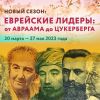Last week, Booknik read novels by Myriam Beaudoin, Scarlett Thomas, Vladimir (Ze'ev) Jabotinsky, and Boris Zhitkov, as well as poetry by Samuil Marshak, and Edouard Bagritsky, and biographies of Mieczysław Weinberg, and Yossele Rosenblatt. He also studied the history of kibbutzim, walked in the city of Lod, inspected derelict buildings in the city of Jerusalem, showed his kids the city of Berlin, watched How I Ended This Summer, and Commissar, learned still more M-words, selected the most beautiful tree, and put parsley into a centrifuge. Booknik Jr. also read Jabotinsky, and continued reading the tale of the letter ב’s misadventures. He turned a plastic bottle into an objet d'art, selected the most absurd teacher’s reprimand in his school record book, gathered oranges, and read a book about a monkey.
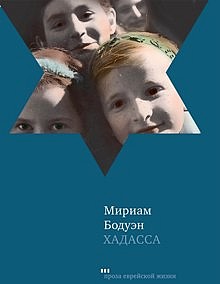
Hadassa, by Myriam Beaudoin
Everything in this book happens, like, now, and the main character is the French teacher in a Jewish girls school in the Montreal Hasidic community. Alice shows her students “the big world” with the help of books, and the girls, in their turn, help her to understand “hadassa,” the hidden beauty of the Jewish world. Booknik reviewer Yevgenia Ritz reads the novel published in the “Prose of Jewish Life” book series supported by the AVI CHAI Foundation, and discusses the mutual understanding of the dissimilar.
Not a Bang, Not a Whimper
Our Tragic Universe, by Scarlett Thomas
“Lean not unto thine own understanding,” and “be not wise in thine own eyes,” King Solomon taught us, and in the storyless story this method seems the best, ‘cause the intellect won’t help you. The intellect looks for rational answers but there are none here, and the finale, and catharsis take place somewhere beyond the story. The story’s finale guides a reader to the true ending. Watching a tragedy, a spectator feels compassion in real time. When a koan is said, a pupil experiences an illumination in the silence that follows. Scarlett Thomas’ heroine can’t write her real novel (as opposed to the SF ones she had already written) for she finds herself in the vise of the genre literature. She teaches creative writing, and, like every other author of European kind, she is poisoned by Aristotle’s Poetics. She writes a novel but what she really wants to write is a storyless story. Booknik’s managing editor Nastik Gryzunova reads the novel by Scarlett Thomas in a typical European’s frustration.
The British Breakthrough
Mieczysław Weinberg: In Search of Freedom, by David Fanning
Weinberg looks like a border figure born by the Russo-Polish-Jewish context. In his Tashkent evacuation, he got introduced to the Asiatic musical tradition, too, and in some of his works even Uzbek instruments are used. The overabundance of styles that could overwhelm some was a source of inspiration for Weinberg. Influences and borrowings melted into something deeply individual in his music. He was far from formal searches, and he strived for his musical texts being handcrafted. Alexey Mokrousov reads Mieczysław Weinberg’s biography, and Booknik reads his review courtesy of the Lechaim magazine.
…and other mellifluous melodies in the Books & Reviews section.

The Kibbutzim and their inhabitants are a myth for those who don’t live in Israel. “Is it true that everything was a common property for them, including wives and kids?” is a typical question asked by the people who can’t believe that communism can be built in an individual village. Or can’t it? The issue is still hotly discussed, and they still write volumes about it. As befits Booknik, we’ve already offered you a sort of chronicle, telling you about the Kibbutzim art, centenarian Degania inhabitants or the book on the Kibbutzim ideology’s evolution. Now, we publish the story by our Israeli reporter Ariel Bulstein on the Cinema Kibbutz film festival, and his selection of facts about the Kibbutz life in the 21st century.
Jewish Caruso
In the summer of 2010, The New York Times unexpectedly published a long story about a man named Josef “Yossele” Rosenblatt. The reason to remember the singer who died in 1933, was the restoration of his 78 rpm recordings done by the “Mostly Music” record store in Brooklyn. Boris Barabanov tells the story of the Jewish cantor in the Lechaim magazine.
…and many other refined recordings in the Articles & Interviews section.
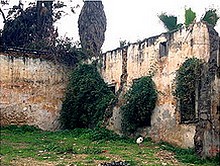
On November 2, the regular “Architectural Evening” took place, organized by the architects Kerem Halbrecht and Michael Jacobson. It was mysteriously and laconically called “Natush.” In Hebrew, this word means “abandoned,” and the evening was dedicated to derelict houses. If the architecture is a frozen symphony, the architecture of derelict buildings may be its final chords. Those fading sounds have their ardent fans, too. Booknik’s tireless Israeli reporter Ariel Bulstein tells about these people, derelict houses, and the history that fades away.
1000 and One Faces of Lod
The city of Lod’s history is amazing. For six thousand years, it has been constantly inhabited by someone. They found the most beautiful mosaic in Israel there, created by artisans in the 3rd century. The church where St. George is buried is located here, as well as other historical landmarks. However, today the city is one of the least problem-free Israeli cities, with the crime rate soaring, and the urban infrastructure largely underdeveloped. In order to draw attention to the city, and initiate its cultural revitalization, they organized the festival called “1000 Nights and Lod” where our ubiquitous Ariel Bulstein went.
…and many other Israeli issues in the Events & Reports section.
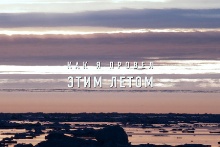
How I Ended This Summer, directed by Alexey Popogrebsky
This is a slow meditative movie, with long shots of Northern hills, the sky, and the ocean. There are also fish, radio, and silence. A man watches the nature. He may be in love with it, but his love is unrequited. The nature does not need men. The Chukotka hills do not need corpses of airplanes, and rusted oil cans left here by generations of polar explorers. The outpost’s head does not need an intern. The intern does not need the silence. Masha Tuuborg, our own expert in communications that inevitably turn out to be intercultural, watches the film directed by Alexey Popogrebsky, and thinks about simple things.
…and many other external extremes in the Columns & Columns section.
Two Cities, the Tale of
This is, obviously, one and the same city, Odessa of the early 20th century where both Boris Zhitkov, and Vladimir Jabotinsky spent their youths. The former one was a sailor, the latter one, a journalist. These young people were acquainted, and they were even friends. Zhitkov helped his Jewish friends, including Jabotinsky, in organizing militia during pogroms. They both wrote very different books, with very different fates. Booknik contributor Valery Shubinsky tells of two Odessas that are really one city.
…and many other urban fantasies in the Stories & Essays section.
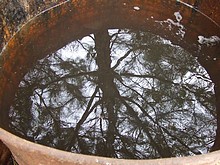
Booknik concludes his exercises in psychological dendrology. However, you still may have time to step out on the street, and take a picture of a tree. Not a whole wood of them, not a shrub, and not a street light even though many trees in the fall do look like ones. A Tree! One of the key symbols in the global culture, the one that has many layers. Bible compares righteous men to trees, and sometimes the people of Israel reminds the Bible authors of a tree, or a body of a lover. In War and Peace, a pessimist oak turns into an optimist. Trees usually live longer than people, and they sure remember more. Moreover, trees may be female and male. So your pictures should feature only one tree, and there may be other objects but not humans. And the main requisition is that your tree should have its own character. We accept works until November 10, and you still have two more days to send in your submissions. The winners will receive prizes that will help them take even better pictures.
Marshak and Bagritsky
November 3 was the birthday of two wonderful poets, Samuil Marshak, and Edouard Bagritsky. Booknik loves their poems he has been reading since his early childhood, so now, he wonders what our readers know and remember about it, and them.
…and many other memorable lines in the Contests & Quizzes section.
A Flickering Jew 9: In the Town of Berdichev
Yefum Magazinik, the Jewish father of many children, believes in the good and kind international solidarity, and hopes that the Pale is going to be abolished, and they will no longer forcefully cut people’s beards, and heads. He also believes that there will be the day when an electric streetcar will run through the town of Berdichev. Klavdia Vavilova, a severe commissar of the Red Army, does not believe in fairy tales, and she lives by the tough wartime laws. When the communist party’s central committee ordered Commissar not only to be shelved but actually destroyed, a miracle was the only thing the film director Alexander Askoldov believed in. And the miracle happened, when another film director, Sergey Gerasimov, hid a copy of the film in his safe. They watched Commissar only twenty years later. Booknik’s editor-in-chief and film critic Sergey Kuznetsov tells another story about soviet films.
Hebrarium, the Lexicon of Jewish Whatnots: M5
Who teaches in a cheder? Where you cannot sink? What separated men from women? Watch our Hebrarium, and Kirill Chichayev will teach you.
Don’t Grudge the Brew 60: The Green Salad
Drying your greens is not an easy feat. They use centrifuges in restaurants for that. One simply puts parsley or salad into a contraption that looks like a carousel, and spins it until the water is gone. Our brilliant chef Roman Gershuni will further remind you how you should hold your knife so that all your fingers remain intact, for you will not only need to cut parsley for your today’s salad but also to crush almonds.
…and many other salad days in the Video Blog section.
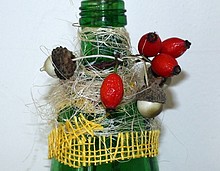
It’s nice to go mushroom-hunting. Mushrooms smell nice. And they can be quite beautiful, too. Especially fly agarics (though you cannot eat them, of course). Plus, mushrooms are easy to draw, just put a stick there, add a hat to it, and presto. Today, you will learn how the fly agarics you draw can turn a common and boring plastic bottle into a work of art. Katerina Bazhenova can do wonderful things with stuff, so she will teach our not especially grown up readers how to turn a usual object into an unusual one.
Altalena
Ze’ev Jabotinsky was a very talented writer. The Russian classic Alexander Kuprin thought Jabotinsky could become “an eagle of the Russian literature” but this Odessa author was seduced by the Zionism, Kuprin thought. An eagle he did not become but he accused the Russian literature of anti-Semitism. Marina Karpova and Yevgeny Levin tell this and other facts about Jabotinsky.
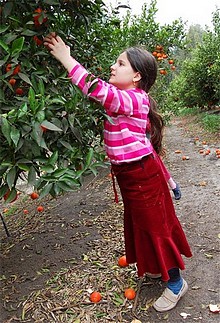
Oranges should be eaten in winter, not sitting at a table but right in an orange grove. The juice should drip everywhere. Every year, in the Israeli garden “Orange Path” they open the season of citrus gathering. Last year, Booknik Jr. had a whole sack of oranges there, and he ate so many tangerines that he had enough for a long, long while. Now, he wants to go there again, so he invites you to come along. Yelizaveta Guller tells you how they gather fruit in Israel.
Berlin Donuts
The fall vacation is the time to get acquainted with European capitals, and Berlin is one of the most children-friendly cities in the world. It is easy to navigate by public transport, and the fall season here is mild. It’s so warm that you can even take a boat ride. Nellie Shulman teaches parents how to walk their kids in Berlin.
In a Dungeon
Booknik Jr. continues with the story by Max Weinreich about the ב letter’s misadventures, and rash conclusions.
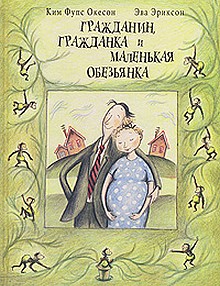
Manden og damen og noget i maven, by Kim Fupz Aakeson
There once was a man, and a woman he married,
And they had a child for whom they not much cared.
Nevertheless, this story is much more complicated and beautiful than it sounds. Alexandra Dovlatova-Mechik reads a book about kids and their parents with a rather radical twist.
A School Record Book
“Outrageous!” “Scandalous!” “Parents should come to school immediately!” These are probably the most terrible notes written in a school record book of any kid. But those reprimands can be rather different, unexpected, funny, annoying or plain stupid. Booknik Jr. has finished the best-absurd-teacher’s-writing-in-a-school-record-book contest. November 8 (which is today) is the very last day you can vote on the best (or your favorite) of those hysterically funny and patently stupid remarks your teachers try to cripple their karmas with. Don’t be like them, participate!
…and many other momentous monkeys at Booknik Jr., also known as Family Booknik, our own web site for kids and their parents.
You Didn’t Know That But Talmud Is All Around You
On November 7, the Eshkolot Project supported by the AVI CHAI Foundation had the roundtable discussion “Constructive Philology: Midrash in the Contemporary Literature and Cinema.” Booknik’s contributing editor Galina Zelenina, and our faithful contributors Reuven Kipervasser and Maxim Eidis participated. Apart from that, in November, Reuven Kipervasser will conduct four mini seminars “Reading Travel Stories from Talmud” for the Eshkolot Project.
Come as you aren’t. Booknik and Family Booknik are supported by the AVI CHAI Foundation.









